

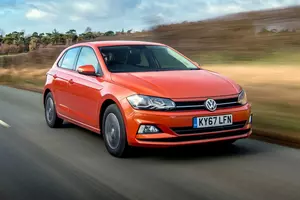
2018 Polo VI

2014 CrossPolo V (facelift 2014)
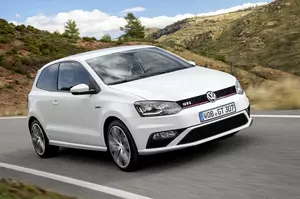
2014 Polo V (facelift 2014)
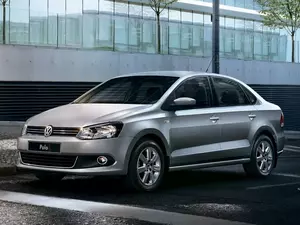
2014 Polo V Sedan (facelift 2014)
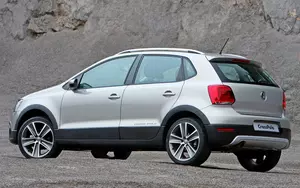
2010 CrossPolo V
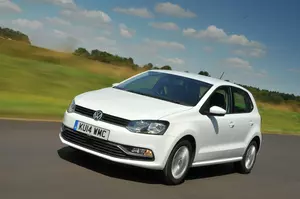
2009 Polo V
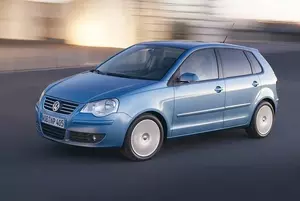
2005 Polo IV (9N; facaleift 2005)
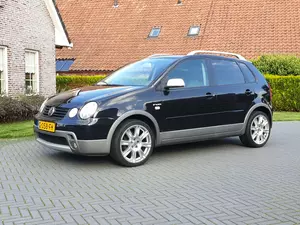
2004 Polo IV Fun
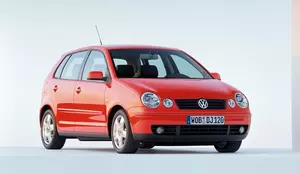
2001 Polo IV (9N)
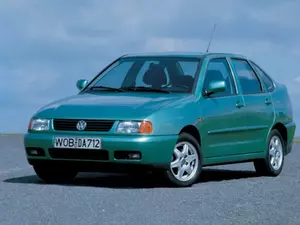
1994 Polo III Classic
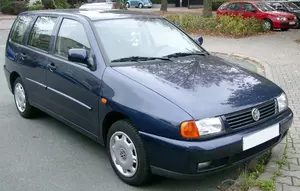
1994 Polo III Variant

1994 Polo III (6N/6KV)
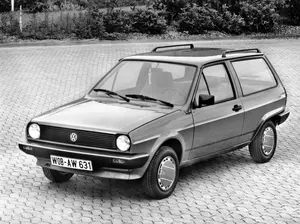
1981 Polo II (86C)
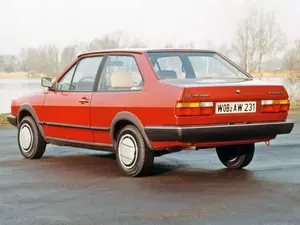
1981 Polo II Coupe (86C)
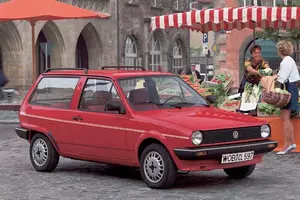
1981 Polo II Classic (86C)
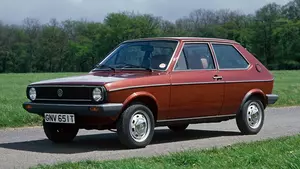
1975 Polo I (86)

| Vehicle | Precise engine size | Difference from world average | Engine size to consumption ratio | Horsepower from 1 L | Engine size to 100 kg of weight |
|---|---|---|---|---|---|
| 1.0 |
1 L (999 cc) |
57.4% smaller | 20 cc to 1 mpg | 65 hp from 1 L | 91 cc to 100 kg |
| 1.0 TSI |
1 L (999 cc) |
57.4% smaller | 20 cc to 1 mpg | 95 hp from 1 L | 91 cc to 100 kg |
| 1.0 TGI |
1 L (999 cc) |
57.4% smaller | 20 cc to 1 mpg | 90 hp from 1 L | 83 cc to 100 kg |
| 1.6 TDI |
1.6 L (1598 cc) |
31.9% smaller | 27 cc to 1 mpg | 59 hp from 1 L | 123 cc to 100 kg |
| GTI 2.0 TSI |
1.98 L (1984 cc) |
15.4% smaller | 54 cc to 1 mpg | 101 hp from 1 L | 153 cc to 100 kg |
| GTI R5 1.6 |
1.61 L (1614 cc) |
31.2% smaller | - | 169 hp from 1 L | 135 cc to 100 kg |
| 1.5 TSI |
1.5 L (1498 cc) |
36.1% smaller | 33 cc to 1 mpg | 100 hp from 1 L | 125 cc to 100 kg |
| Vehicle | 1.0 |
|---|---|
| Precise engine size | 1 L (999 cc) |
| Difference from world average | 57.4 smaller |
| Engine size to consumption ratio | 20 cc to 1 mpg |
| Horsepower from 1 L | 65 hp from 1 L |
| Engine size to 100 kg of weight | 91 cc to 100 kg |
| Vehicle | 1.0 TSI |
| Precise engine size | 1 L (999 cc) |
| Difference from world average | 57.4 smaller |
| Engine size to consumption ratio | 20 cc to 1 mpg |
| Horsepower from 1 L | 95 hp from 1 L |
| Engine size to 100 kg of weight | 91 cc to 100 kg |
| Vehicle | 1.0 TGI |
| Precise engine size | 1 L (999 cc) |
| Difference from world average | 57.4 smaller |
| Engine size to consumption ratio | 20 cc to 1 mpg |
| Horsepower from 1 L | 90 hp from 1 L |
| Engine size to 100 kg of weight | 83 cc to 100 kg |
| Vehicle | 1.6 TDI |
| Precise engine size | 1.6 L (1598 cc) |
| Difference from world average | 31.9 smaller |
| Engine size to consumption ratio | 27 cc to 1 mpg |
| Horsepower from 1 L | 59 hp from 1 L |
| Engine size to 100 kg of weight | 123 cc to 100 kg |
| Vehicle | GTI 2.0 TSI |
| Precise engine size | 1.98 L (1984 cc) |
| Difference from world average | 15.4 smaller |
| Engine size to consumption ratio | 54 cc to 1 mpg |
| Horsepower from 1 L | 101 hp from 1 L |
| Engine size to 100 kg of weight | 153 cc to 100 kg |
| Vehicle | GTI R5 1.6 |
| Precise engine size | 1.61 L (1614 cc) |
| Difference from world average | 31.2 smaller |
| Engine size to consumption ratio | - |
| Horsepower from 1 L | 169 hp from 1 L |
| Engine size to 100 kg of weight | 135 cc to 100 kg |
| Vehicle | 1.5 TSI |
| Precise engine size | 1.5 L (1498 cc) |
| Difference from world average | 36.1 smaller |
| Engine size to consumption ratio | 33 cc to 1 mpg |
| Horsepower from 1 L | 100 hp from 1 L |
| Engine size to 100 kg of weight | 125 cc to 100 kg |

| Vehicle | Precise engine size | Difference from world average | Engine size to consumption ratio | Horsepower from 1 L | Engine size to 100 kg of weight |
|---|---|---|---|---|---|
| 1.2 TSI |
1.2 L (1197 cc) |
49% smaller | 25 cc to 1 mpg | 92 hp from 1 L | 109 cc to 100 kg |
| 1.4 TDI |
1.42 L (1422 cc) |
39.4% smaller | 24 cc to 1 mpg | 63 hp from 1 L | 119 cc to 100 kg |
| 1.0 TSI |
1 L (999 cc) |
57.4% smaller | 20 cc to 1 mpg | 110 hp from 1 L | 91 cc to 100 kg |
| Vehicle | 1.2 TSI |
|---|---|
| Precise engine size | 1.2 L (1197 cc) |
| Difference from world average | 49 smaller |
| Engine size to consumption ratio | 25 cc to 1 mpg |
| Horsepower from 1 L | 92 hp from 1 L |
| Engine size to 100 kg of weight | 109 cc to 100 kg |
| Vehicle | 1.4 TDI |
| Precise engine size | 1.42 L (1422 cc) |
| Difference from world average | 39.4 smaller |
| Engine size to consumption ratio | 24 cc to 1 mpg |
| Horsepower from 1 L | 63 hp from 1 L |
| Engine size to 100 kg of weight | 119 cc to 100 kg |
| Vehicle | 1.0 TSI |
| Precise engine size | 1 L (999 cc) |
| Difference from world average | 57.4 smaller |
| Engine size to consumption ratio | 20 cc to 1 mpg |
| Horsepower from 1 L | 110 hp from 1 L |
| Engine size to 100 kg of weight | 91 cc to 100 kg |

| Vehicle | Precise engine size | Difference from world average | Engine size to consumption ratio | Horsepower from 1 L | Engine size to 100 kg of weight |
|---|---|---|---|---|---|
| GTI 1.8 TSI |
1.8 L (1798 cc) |
23.4% smaller | 43 cc to 1 mpg | 107 hp from 1 L | 150 cc to 100 kg |
| 1.0 TSI |
1 L (999 cc) |
57.4% smaller | 18 cc to 1 mpg | 110 hp from 1 L | 100 cc to 100 kg |
| 1.0 |
1 L (999 cc) |
57.4% smaller | 20 cc to 1 mpg | 60 hp from 1 L | 91 cc to 100 kg |
| 1.4 TDI |
1.42 L (1422 cc) |
39.4% smaller | 21 cc to 1 mpg | 63 hp from 1 L | 119 cc to 100 kg |
| 1.2 TSI |
1.2 L (1197 cc) |
49% smaller | 24 cc to 1 mpg | 92 hp from 1 L | 100 cc to 100 kg |
| Vehicle | GTI 1.8 TSI |
|---|---|
| Precise engine size | 1.8 L (1798 cc) |
| Difference from world average | 23.4 smaller |
| Engine size to consumption ratio | 43 cc to 1 mpg |
| Horsepower from 1 L | 107 hp from 1 L |
| Engine size to 100 kg of weight | 150 cc to 100 kg |
| Vehicle | 1.0 TSI |
| Precise engine size | 1 L (999 cc) |
| Difference from world average | 57.4 smaller |
| Engine size to consumption ratio | 18 cc to 1 mpg |
| Horsepower from 1 L | 110 hp from 1 L |
| Engine size to 100 kg of weight | 100 cc to 100 kg |
| Vehicle | 1.0 |
| Precise engine size | 1 L (999 cc) |
| Difference from world average | 57.4 smaller |
| Engine size to consumption ratio | 20 cc to 1 mpg |
| Horsepower from 1 L | 60 hp from 1 L |
| Engine size to 100 kg of weight | 91 cc to 100 kg |
| Vehicle | 1.4 TDI |
| Precise engine size | 1.42 L (1422 cc) |
| Difference from world average | 39.4 smaller |
| Engine size to consumption ratio | 21 cc to 1 mpg |
| Horsepower from 1 L | 63 hp from 1 L |
| Engine size to 100 kg of weight | 119 cc to 100 kg |
| Vehicle | 1.2 TSI |
| Precise engine size | 1.2 L (1197 cc) |
| Difference from world average | 49 smaller |
| Engine size to consumption ratio | 24 cc to 1 mpg |
| Horsepower from 1 L | 92 hp from 1 L |
| Engine size to 100 kg of weight | 100 cc to 100 kg |

| Vehicle | Precise engine size | Difference from world average | Engine size to consumption ratio | Horsepower from 1 L | Engine size to 100 kg of weight |
|---|---|---|---|---|---|
| 1.6 MPI |
1.6 L (1598 cc) |
31.9% smaller | 40 cc to 1 mpg | 69 hp from 1 L | 133 cc to 100 kg |
| 1.4 TSI |
1.4 L (1395 cc) |
40.5% smaller | 34 cc to 1 mpg | 89 hp from 1 L | 116 cc to 100 kg |
| Vehicle | 1.6 MPI |
|---|---|
| Precise engine size | 1.6 L (1598 cc) |
| Difference from world average | 31.9 smaller |
| Engine size to consumption ratio | 40 cc to 1 mpg |
| Horsepower from 1 L | 69 hp from 1 L |
| Engine size to 100 kg of weight | 133 cc to 100 kg |
| Vehicle | 1.4 TSI |
| Precise engine size | 1.4 L (1395 cc) |
| Difference from world average | 40.5 smaller |
| Engine size to consumption ratio | 34 cc to 1 mpg |
| Horsepower from 1 L | 89 hp from 1 L |
| Engine size to 100 kg of weight | 116 cc to 100 kg |

| Vehicle | Precise engine size | Difference from world average | Engine size to consumption ratio | Horsepower from 1 L | Engine size to 100 kg of weight |
|---|---|---|---|---|---|
| 1.4 |
1.39 L (1390 cc) |
40.8% smaller | 36 cc to 1 mpg | 61 hp from 1 L | 116 cc to 100 kg |
| 1.6 TDI |
1.6 L (1598 cc) |
31.9% smaller | 31 cc to 1 mpg | 56 hp from 1 L | 133 cc to 100 kg |
| 1.2 TSI |
1.2 L (1197 cc) |
49% smaller | 25 cc to 1 mpg | 92 hp from 1 L | 100 cc to 100 kg |
| 1.4 TDI |
1.42 L (1422 cc) |
39.4% smaller | 22 cc to 1 mpg | 63 hp from 1 L | 119 cc to 100 kg |
| Vehicle | 1.4 |
|---|---|
| Precise engine size | 1.39 L (1390 cc) |
| Difference from world average | 40.8 smaller |
| Engine size to consumption ratio | 36 cc to 1 mpg |
| Horsepower from 1 L | 61 hp from 1 L |
| Engine size to 100 kg of weight | 116 cc to 100 kg |
| Vehicle | 1.6 TDI |
| Precise engine size | 1.6 L (1598 cc) |
| Difference from world average | 31.9 smaller |
| Engine size to consumption ratio | 31 cc to 1 mpg |
| Horsepower from 1 L | 56 hp from 1 L |
| Engine size to 100 kg of weight | 133 cc to 100 kg |
| Vehicle | 1.2 TSI |
| Precise engine size | 1.2 L (1197 cc) |
| Difference from world average | 49 smaller |
| Engine size to consumption ratio | 25 cc to 1 mpg |
| Horsepower from 1 L | 92 hp from 1 L |
| Engine size to 100 kg of weight | 100 cc to 100 kg |
| Vehicle | 1.4 TDI |
| Precise engine size | 1.42 L (1422 cc) |
| Difference from world average | 39.4 smaller |
| Engine size to consumption ratio | 22 cc to 1 mpg |
| Horsepower from 1 L | 63 hp from 1 L |
| Engine size to 100 kg of weight | 119 cc to 100 kg |

| Vehicle | Precise engine size | Difference from world average | Engine size to consumption ratio | Horsepower from 1 L | Engine size to 100 kg of weight |
|---|---|---|---|---|---|
| 1.2 |
1.2 L (1199 cc) |
48.9% smaller | 19 cc to 1 mpg | 63 hp from 1 L | 109 cc to 100 kg |
| 1.4 |
1.39 L (1390 cc) |
40.8% smaller | 34 cc to 1 mpg | 61 hp from 1 L | 126 cc to 100 kg |
| 1.6 TDI |
1.6 L (1598 cc) |
31.9% smaller | 29 cc to 1 mpg | 47 hp from 1 L | 133 cc to 100 kg |
| 1.6 |
1.6 L (1598 cc) |
31.9% smaller | 29 cc to 1 mpg | 56 hp from 1 L | 133 cc to 100 kg |
| Vehicle | 1.2 |
|---|---|
| Precise engine size | 1.2 L (1199 cc) |
| Difference from world average | 48.9 smaller |
| Engine size to consumption ratio | 19 cc to 1 mpg |
| Horsepower from 1 L | 63 hp from 1 L |
| Engine size to 100 kg of weight | 109 cc to 100 kg |
| Vehicle | 1.4 |
| Precise engine size | 1.39 L (1390 cc) |
| Difference from world average | 40.8 smaller |
| Engine size to consumption ratio | 34 cc to 1 mpg |
| Horsepower from 1 L | 61 hp from 1 L |
| Engine size to 100 kg of weight | 126 cc to 100 kg |
| Vehicle | 1.6 TDI |
| Precise engine size | 1.6 L (1598 cc) |
| Difference from world average | 31.9 smaller |
| Engine size to consumption ratio | 29 cc to 1 mpg |
| Horsepower from 1 L | 47 hp from 1 L |
| Engine size to 100 kg of weight | 133 cc to 100 kg |
| Vehicle | 1.6 |
| Precise engine size | 1.6 L (1598 cc) |
| Difference from world average | 31.9 smaller |
| Engine size to consumption ratio | 29 cc to 1 mpg |
| Horsepower from 1 L | 56 hp from 1 L |
| Engine size to 100 kg of weight | 133 cc to 100 kg |

| Vehicle | Precise engine size | Difference from world average | Engine size to consumption ratio | Horsepower from 1 L | Engine size to 100 kg of weight |
|---|---|---|---|---|---|
| 1.2 |
1.2 L (1198 cc) |
48.9% smaller | 29 cc to 1 mpg | 58 hp from 1 L | 109 cc to 100 kg |
| 1.4 |
1.39 L (1390 cc) |
40.8% smaller | 41 cc to 1 mpg | 58 hp from 1 L | 126 cc to 100 kg |
| 1.4 TDI |
1.42 L (1422 cc) |
39.4% smaller | - | 56 hp from 1 L | 129 cc to 100 kg |
| 1.6 |
1.6 L (1598 cc) |
31.9% smaller | 50 cc to 1 mpg | 66 hp from 1 L | 145 cc to 100 kg |
| 1.9 TDI |
1.9 L (1896 cc) |
19.2% smaller | 42 cc to 1 mpg | 68 hp from 1 L | 158 cc to 100 kg |
| GTI 1.8 |
1.78 L (1781 cc) |
24.1% smaller | 59 cc to 1 mpg | 84 hp from 1 L | 162 cc to 100 kg |
| GTI Cup 1.8 |
1.78 L (1781 cc) |
24.1% smaller | 59 cc to 1 mpg | 101 hp from 1 L | 162 cc to 100 kg |
| Vehicle | 1.2 |
|---|---|
| Precise engine size | 1.2 L (1198 cc) |
| Difference from world average | 48.9 smaller |
| Engine size to consumption ratio | 29 cc to 1 mpg |
| Horsepower from 1 L | 58 hp from 1 L |
| Engine size to 100 kg of weight | 109 cc to 100 kg |
| Vehicle | 1.4 |
| Precise engine size | 1.39 L (1390 cc) |
| Difference from world average | 40.8 smaller |
| Engine size to consumption ratio | 41 cc to 1 mpg |
| Horsepower from 1 L | 58 hp from 1 L |
| Engine size to 100 kg of weight | 126 cc to 100 kg |
| Vehicle | 1.4 TDI |
| Precise engine size | 1.42 L (1422 cc) |
| Difference from world average | 39.4 smaller |
| Engine size to consumption ratio | - |
| Horsepower from 1 L | 56 hp from 1 L |
| Engine size to 100 kg of weight | 129 cc to 100 kg |
| Vehicle | 1.6 |
| Precise engine size | 1.6 L (1598 cc) |
| Difference from world average | 31.9 smaller |
| Engine size to consumption ratio | 50 cc to 1 mpg |
| Horsepower from 1 L | 66 hp from 1 L |
| Engine size to 100 kg of weight | 145 cc to 100 kg |
| Vehicle | 1.9 TDI |
| Precise engine size | 1.9 L (1896 cc) |
| Difference from world average | 19.2 smaller |
| Engine size to consumption ratio | 42 cc to 1 mpg |
| Horsepower from 1 L | 68 hp from 1 L |
| Engine size to 100 kg of weight | 158 cc to 100 kg |
| Vehicle | GTI 1.8 |
| Precise engine size | 1.78 L (1781 cc) |
| Difference from world average | 24.1 smaller |
| Engine size to consumption ratio | 59 cc to 1 mpg |
| Horsepower from 1 L | 84 hp from 1 L |
| Engine size to 100 kg of weight | 162 cc to 100 kg |
| Vehicle | GTI Cup 1.8 |
| Precise engine size | 1.78 L (1781 cc) |
| Difference from world average | 24.1 smaller |
| Engine size to consumption ratio | 59 cc to 1 mpg |
| Horsepower from 1 L | 101 hp from 1 L |
| Engine size to 100 kg of weight | 162 cc to 100 kg |

| Vehicle | Precise engine size | Difference from world average | Engine size to consumption ratio | Horsepower from 1 L | Engine size to 100 kg of weight |
|---|---|---|---|---|---|
| 1.4 i 16V |
1.39 L (1390 cc) |
40.8% smaller | 40 cc to 1 mpg | 54 hp from 1 L | 126 cc to 100 kg |
| 1.2 i |
1.2 L (1198 cc) |
48.9% smaller | 32 cc to 1 mpg | 45 hp from 1 L | 109 cc to 100 kg |
| 1.2 i 12V |
1.2 L (1198 cc) |
48.9% smaller | 32 cc to 1 mpg | 53 hp from 1 L | 109 cc to 100 kg |
| 1.4 i 16V |
1.39 L (1390 cc) |
40.8% smaller | 40 cc to 1 mpg | 72 hp from 1 L | 126 cc to 100 kg |
| 1.4 FSI |
1.39 L (1390 cc) |
40.8% smaller | 36 cc to 1 mpg | 62 hp from 1 L | 126 cc to 100 kg |
| 1.4 TDI |
1.42 L (1422 cc) |
39.4% smaller | 30 cc to 1 mpg | 56 hp from 1 L | 119 cc to 100 kg |
| 1.9 TDI |
1.9 L (1896 cc) |
19.2% smaller | 41 cc to 1 mpg | 53 hp from 1 L | 158 cc to 100 kg |
| Vehicle | 1.4 i 16V |
|---|---|
| Precise engine size | 1.39 L (1390 cc) |
| Difference from world average | 40.8 smaller |
| Engine size to consumption ratio | 40 cc to 1 mpg |
| Horsepower from 1 L | 54 hp from 1 L |
| Engine size to 100 kg of weight | 126 cc to 100 kg |
| Vehicle | 1.2 i |
| Precise engine size | 1.2 L (1198 cc) |
| Difference from world average | 48.9 smaller |
| Engine size to consumption ratio | 32 cc to 1 mpg |
| Horsepower from 1 L | 45 hp from 1 L |
| Engine size to 100 kg of weight | 109 cc to 100 kg |
| Vehicle | 1.2 i 12V |
| Precise engine size | 1.2 L (1198 cc) |
| Difference from world average | 48.9 smaller |
| Engine size to consumption ratio | 32 cc to 1 mpg |
| Horsepower from 1 L | 53 hp from 1 L |
| Engine size to 100 kg of weight | 109 cc to 100 kg |
| Vehicle | 1.4 i 16V |
| Precise engine size | 1.39 L (1390 cc) |
| Difference from world average | 40.8 smaller |
| Engine size to consumption ratio | 40 cc to 1 mpg |
| Horsepower from 1 L | 72 hp from 1 L |
| Engine size to 100 kg of weight | 126 cc to 100 kg |
| Vehicle | 1.4 FSI |
| Precise engine size | 1.39 L (1390 cc) |
| Difference from world average | 40.8 smaller |
| Engine size to consumption ratio | 36 cc to 1 mpg |
| Horsepower from 1 L | 62 hp from 1 L |
| Engine size to 100 kg of weight | 126 cc to 100 kg |
| Vehicle | 1.4 TDI |
| Precise engine size | 1.42 L (1422 cc) |
| Difference from world average | 39.4 smaller |
| Engine size to consumption ratio | 30 cc to 1 mpg |
| Horsepower from 1 L | 56 hp from 1 L |
| Engine size to 100 kg of weight | 119 cc to 100 kg |
| Vehicle | 1.9 TDI |
| Precise engine size | 1.9 L (1896 cc) |
| Difference from world average | 19.2 smaller |
| Engine size to consumption ratio | 41 cc to 1 mpg |
| Horsepower from 1 L | 53 hp from 1 L |
| Engine size to 100 kg of weight | 158 cc to 100 kg |

| Vehicle | Precise engine size | Difference from world average | Engine size to consumption ratio | Horsepower from 1 L | Engine size to 100 kg of weight |
|---|---|---|---|---|---|
| 1.4 16V |
1.39 L (1390 cc) |
40.8% smaller | - | 54 hp from 1 L | 139 cc to 100 kg |
| 1.2 i |
1.2 L (1198 cc) |
48.9% smaller | - | 45 hp from 1 L | 120 cc to 100 kg |
| 1.2 i 12V |
1.2 L (1198 cc) |
48.9% smaller | 32 cc to 1 mpg | 53 hp from 1 L | 120 cc to 100 kg |
| 1.4 FSI |
1.39 L (1390 cc) |
40.8% smaller | - | 62 hp from 1 L | 139 cc to 100 kg |
| 1.4 TDI |
1.42 L (1422 cc) |
39.4% smaller | 27 cc to 1 mpg | 56 hp from 1 L | 142 cc to 100 kg |
| 1.9 SDI |
1.9 L (1896 cc) |
19.2% smaller | - | 34 hp from 1 L | 172 cc to 100 kg |
| 1.9 TDI |
1.9 L (1896 cc) |
19.2% smaller | 40 cc to 1 mpg | 68 hp from 1 L | 172 cc to 100 kg |
| Vehicle | 1.4 16V |
|---|---|
| Precise engine size | 1.39 L (1390 cc) |
| Difference from world average | 40.8 smaller |
| Engine size to consumption ratio | - |
| Horsepower from 1 L | 54 hp from 1 L |
| Engine size to 100 kg of weight | 139 cc to 100 kg |
| Vehicle | 1.2 i |
| Precise engine size | 1.2 L (1198 cc) |
| Difference from world average | 48.9 smaller |
| Engine size to consumption ratio | - |
| Horsepower from 1 L | 45 hp from 1 L |
| Engine size to 100 kg of weight | 120 cc to 100 kg |
| Vehicle | 1.2 i 12V |
| Precise engine size | 1.2 L (1198 cc) |
| Difference from world average | 48.9 smaller |
| Engine size to consumption ratio | 32 cc to 1 mpg |
| Horsepower from 1 L | 53 hp from 1 L |
| Engine size to 100 kg of weight | 120 cc to 100 kg |
| Vehicle | 1.4 FSI |
| Precise engine size | 1.39 L (1390 cc) |
| Difference from world average | 40.8 smaller |
| Engine size to consumption ratio | - |
| Horsepower from 1 L | 62 hp from 1 L |
| Engine size to 100 kg of weight | 139 cc to 100 kg |
| Vehicle | 1.4 TDI |
| Precise engine size | 1.42 L (1422 cc) |
| Difference from world average | 39.4 smaller |
| Engine size to consumption ratio | 27 cc to 1 mpg |
| Horsepower from 1 L | 56 hp from 1 L |
| Engine size to 100 kg of weight | 142 cc to 100 kg |
| Vehicle | 1.9 SDI |
| Precise engine size | 1.9 L (1896 cc) |
| Difference from world average | 19.2 smaller |
| Engine size to consumption ratio | - |
| Horsepower from 1 L | 34 hp from 1 L |
| Engine size to 100 kg of weight | 172 cc to 100 kg |
| Vehicle | 1.9 TDI |
| Precise engine size | 1.9 L (1896 cc) |
| Difference from world average | 19.2 smaller |
| Engine size to consumption ratio | 40 cc to 1 mpg |
| Horsepower from 1 L | 68 hp from 1 L |
| Engine size to 100 kg of weight | 172 cc to 100 kg |

| Vehicle | Precise engine size | Difference from world average | Engine size to consumption ratio | Horsepower from 1 L | Engine size to 100 kg of weight |
|---|---|---|---|---|---|
| 1.6 |
1.6 L (1595 cc) |
32% smaller | 51 cc to 1 mpg | 63 hp from 1 L | 145 cc to 100 kg |
| 1.7 SDI |
1.72 L (1716 cc) |
26.9% smaller | - | 35 hp from 1 L | 156 cc to 100 kg |
| 110 1.9 TDI |
1.9 L (1896 cc) |
19.2% smaller | - | 58 hp from 1 L | 172 cc to 100 kg |
| 1.8 |
1.78 L (1781 cc) |
24.1% smaller | - | 54 hp from 1 L | 162 cc to 100 kg |
| 60 1.4 |
1.39 L (1390 cc) |
40.8% smaller | - | 43 hp from 1 L | 154 cc to 100 kg |
| 64 1.9 SDI |
1.9 L (1896 cc) |
19.2% smaller | 39 cc to 1 mpg | 34 hp from 1 L | 172 cc to 100 kg |
| 68 1.9 SDI |
1.9 L (1896 cc) |
19.2% smaller | - | 36 hp from 1 L | 172 cc to 100 kg |
| 75 1.6 |
1.6 L (1598 cc) |
31.9% smaller | - | 47 hp from 1 L | 160 cc to 100 kg |
| 75 1.4 16V |
1.39 L (1390 cc) |
40.8% smaller | - | 54 hp from 1 L | 139 cc to 100 kg |
| 90 1.9 TDI |
1.9 L (1896 cc) |
19.2% smaller | - | 47 hp from 1 L | 172 cc to 100 kg |
| Vehicle | 1.6 |
|---|---|
| Precise engine size | 1.6 L (1595 cc) |
| Difference from world average | 32 smaller |
| Engine size to consumption ratio | 51 cc to 1 mpg |
| Horsepower from 1 L | 63 hp from 1 L |
| Engine size to 100 kg of weight | 145 cc to 100 kg |
| Vehicle | 1.7 SDI |
| Precise engine size | 1.72 L (1716 cc) |
| Difference from world average | 26.9 smaller |
| Engine size to consumption ratio | - |
| Horsepower from 1 L | 35 hp from 1 L |
| Engine size to 100 kg of weight | 156 cc to 100 kg |
| Vehicle | 110 1.9 TDI |
| Precise engine size | 1.9 L (1896 cc) |
| Difference from world average | 19.2 smaller |
| Engine size to consumption ratio | - |
| Horsepower from 1 L | 58 hp from 1 L |
| Engine size to 100 kg of weight | 172 cc to 100 kg |
| Vehicle | 1.8 |
| Precise engine size | 1.78 L (1781 cc) |
| Difference from world average | 24.1 smaller |
| Engine size to consumption ratio | - |
| Horsepower from 1 L | 54 hp from 1 L |
| Engine size to 100 kg of weight | 162 cc to 100 kg |
| Vehicle | 60 1.4 |
| Precise engine size | 1.39 L (1390 cc) |
| Difference from world average | 40.8 smaller |
| Engine size to consumption ratio | - |
| Horsepower from 1 L | 43 hp from 1 L |
| Engine size to 100 kg of weight | 154 cc to 100 kg |
| Vehicle | 64 1.9 SDI |
| Precise engine size | 1.9 L (1896 cc) |
| Difference from world average | 19.2 smaller |
| Engine size to consumption ratio | 39 cc to 1 mpg |
| Horsepower from 1 L | 34 hp from 1 L |
| Engine size to 100 kg of weight | 172 cc to 100 kg |
| Vehicle | 68 1.9 SDI |
| Precise engine size | 1.9 L (1896 cc) |
| Difference from world average | 19.2 smaller |
| Engine size to consumption ratio | - |
| Horsepower from 1 L | 36 hp from 1 L |
| Engine size to 100 kg of weight | 172 cc to 100 kg |
| Vehicle | 75 1.6 |
| Precise engine size | 1.6 L (1598 cc) |
| Difference from world average | 31.9 smaller |
| Engine size to consumption ratio | - |
| Horsepower from 1 L | 47 hp from 1 L |
| Engine size to 100 kg of weight | 160 cc to 100 kg |
| Vehicle | 75 1.4 16V |
| Precise engine size | 1.39 L (1390 cc) |
| Difference from world average | 40.8 smaller |
| Engine size to consumption ratio | - |
| Horsepower from 1 L | 54 hp from 1 L |
| Engine size to 100 kg of weight | 139 cc to 100 kg |
| Vehicle | 90 1.9 TDI |
| Precise engine size | 1.9 L (1896 cc) |
| Difference from world average | 19.2 smaller |
| Engine size to consumption ratio | - |
| Horsepower from 1 L | 47 hp from 1 L |
| Engine size to 100 kg of weight | 172 cc to 100 kg |

| Vehicle | Precise engine size | Difference from world average | Engine size to consumption ratio | Horsepower from 1 L | Engine size to 100 kg of weight |
|---|---|---|---|---|---|
| 1.6 |
1.6 L (1598 cc) |
31.9% smaller | - | 47 hp from 1 L | 145 cc to 100 kg |
| 1.4 16V |
1.39 L (1390 cc) |
40.8% smaller | - | 54 hp from 1 L | 126 cc to 100 kg |
| 1.4 |
1.39 L (1390 cc) |
40.8% smaller | - | 39 hp from 1 L | 139 cc to 100 kg |
| 1.7 SDI |
1.72 L (1716 cc) |
26.9% smaller | - | 35 hp from 1 L | 156 cc to 100 kg |
| 1.9 SDI |
1.9 L (1896 cc) |
19.2% smaller | - | 36 hp from 1 L | 158 cc to 100 kg |
| 1.9 TDI |
1.9 L (1896 cc) |
19.2% smaller | - | 47 hp from 1 L | 158 cc to 100 kg |
| Vehicle | 1.6 |
|---|---|
| Precise engine size | 1.6 L (1598 cc) |
| Difference from world average | 31.9 smaller |
| Engine size to consumption ratio | - |
| Horsepower from 1 L | 47 hp from 1 L |
| Engine size to 100 kg of weight | 145 cc to 100 kg |
| Vehicle | 1.4 16V |
| Precise engine size | 1.39 L (1390 cc) |
| Difference from world average | 40.8 smaller |
| Engine size to consumption ratio | - |
| Horsepower from 1 L | 54 hp from 1 L |
| Engine size to 100 kg of weight | 126 cc to 100 kg |
| Vehicle | 1.4 |
| Precise engine size | 1.39 L (1390 cc) |
| Difference from world average | 40.8 smaller |
| Engine size to consumption ratio | - |
| Horsepower from 1 L | 39 hp from 1 L |
| Engine size to 100 kg of weight | 139 cc to 100 kg |
| Vehicle | 1.7 SDI |
| Precise engine size | 1.72 L (1716 cc) |
| Difference from world average | 26.9 smaller |
| Engine size to consumption ratio | - |
| Horsepower from 1 L | 35 hp from 1 L |
| Engine size to 100 kg of weight | 156 cc to 100 kg |
| Vehicle | 1.9 SDI |
| Precise engine size | 1.9 L (1896 cc) |
| Difference from world average | 19.2 smaller |
| Engine size to consumption ratio | - |
| Horsepower from 1 L | 36 hp from 1 L |
| Engine size to 100 kg of weight | 158 cc to 100 kg |
| Vehicle | 1.9 TDI |
| Precise engine size | 1.9 L (1896 cc) |
| Difference from world average | 19.2 smaller |
| Engine size to consumption ratio | - |
| Horsepower from 1 L | 47 hp from 1 L |
| Engine size to 100 kg of weight | 158 cc to 100 kg |

| Vehicle | Precise engine size | Difference from world average | Engine size to consumption ratio | Horsepower from 1 L | Engine size to 100 kg of weight |
|---|---|---|---|---|---|
| 1.6 16V GTI |
1.6 L (1598 cc) |
31.9% smaller | - | 78 hp from 1 L | 160 cc to 100 kg |
| 1.7 SDI |
1.72 L (1716 cc) |
26.9% smaller | 32 cc to 1 mpg | 35 hp from 1 L | 172 cc to 100 kg |
| 1.4 16V |
1.39 L (1390 cc) |
40.8% smaller | - | 72 hp from 1 L | 139 cc to 100 kg |
| 1.0 |
1 L (999 cc) |
57.4% smaller | 23 cc to 1 mpg | 50 hp from 1 L | 111 cc to 100 kg |
| 1.4 |
1.39 L (1390 cc) |
40.8% smaller | 38 cc to 1 mpg | 43 hp from 1 L | 139 cc to 100 kg |
| 1.3 |
1.3 L (1296 cc) |
44.8% smaller | 36 cc to 1 mpg | 42 hp from 1 L | 130 cc to 100 kg |
| 1.9 SDI |
1.9 L (1896 cc) |
19.2% smaller | 45 cc to 1 mpg | 34 hp from 1 L | 190 cc to 100 kg |
| 1.6 |
1.6 L (1595 cc) |
32% smaller | 46 cc to 1 mpg | 47 hp from 1 L | 160 cc to 100 kg |
| Vehicle | 1.6 16V GTI |
|---|---|
| Precise engine size | 1.6 L (1598 cc) |
| Difference from world average | 31.9 smaller |
| Engine size to consumption ratio | - |
| Horsepower from 1 L | 78 hp from 1 L |
| Engine size to 100 kg of weight | 160 cc to 100 kg |
| Vehicle | 1.7 SDI |
| Precise engine size | 1.72 L (1716 cc) |
| Difference from world average | 26.9 smaller |
| Engine size to consumption ratio | 32 cc to 1 mpg |
| Horsepower from 1 L | 35 hp from 1 L |
| Engine size to 100 kg of weight | 172 cc to 100 kg |
| Vehicle | 1.4 16V |
| Precise engine size | 1.39 L (1390 cc) |
| Difference from world average | 40.8 smaller |
| Engine size to consumption ratio | - |
| Horsepower from 1 L | 72 hp from 1 L |
| Engine size to 100 kg of weight | 139 cc to 100 kg |
| Vehicle | 1.0 |
| Precise engine size | 1 L (999 cc) |
| Difference from world average | 57.4 smaller |
| Engine size to consumption ratio | 23 cc to 1 mpg |
| Horsepower from 1 L | 50 hp from 1 L |
| Engine size to 100 kg of weight | 111 cc to 100 kg |
| Vehicle | 1.4 |
| Precise engine size | 1.39 L (1390 cc) |
| Difference from world average | 40.8 smaller |
| Engine size to consumption ratio | 38 cc to 1 mpg |
| Horsepower from 1 L | 43 hp from 1 L |
| Engine size to 100 kg of weight | 139 cc to 100 kg |
| Vehicle | 1.3 |
| Precise engine size | 1.3 L (1296 cc) |
| Difference from world average | 44.8 smaller |
| Engine size to consumption ratio | 36 cc to 1 mpg |
| Horsepower from 1 L | 42 hp from 1 L |
| Engine size to 100 kg of weight | 130 cc to 100 kg |
| Vehicle | 1.9 SDI |
| Precise engine size | 1.9 L (1896 cc) |
| Difference from world average | 19.2 smaller |
| Engine size to consumption ratio | 45 cc to 1 mpg |
| Horsepower from 1 L | 34 hp from 1 L |
| Engine size to 100 kg of weight | 190 cc to 100 kg |
| Vehicle | 1.6 |
| Precise engine size | 1.6 L (1595 cc) |
| Difference from world average | 32 smaller |
| Engine size to consumption ratio | 46 cc to 1 mpg |
| Horsepower from 1 L | 47 hp from 1 L |
| Engine size to 100 kg of weight | 160 cc to 100 kg |

| Vehicle | Precise engine size | Difference from world average | Engine size to consumption ratio | Horsepower from 1 L | Engine size to 100 kg of weight |
|---|---|---|---|---|---|
| 1.0 CAT |
1.04 L (1043 cc) |
55.5% smaller | 30 cc to 1 mpg | 43 hp from 1 L | 130 cc to 100 kg |
| 1.0 |
1.04 L (1043 cc) |
55.5% smaller | - | 43 hp from 1 L | 130 cc to 100 kg |
| 1.3 CAT |
1.27 L (1272 cc) |
45.8% smaller | 37 cc to 1 mpg | 43 hp from 1 L | 159 cc to 100 kg |
| 1.4 D |
1.39 L (1391 cc) |
40.7% smaller | 35 cc to 1 mpg | 35 hp from 1 L | 174 cc to 100 kg |
| Vehicle | 1.0 CAT |
|---|---|
| Precise engine size | 1.04 L (1043 cc) |
| Difference from world average | 55.5 smaller |
| Engine size to consumption ratio | 30 cc to 1 mpg |
| Horsepower from 1 L | 43 hp from 1 L |
| Engine size to 100 kg of weight | 130 cc to 100 kg |
| Vehicle | 1.0 |
| Precise engine size | 1.04 L (1043 cc) |
| Difference from world average | 55.5 smaller |
| Engine size to consumption ratio | - |
| Horsepower from 1 L | 43 hp from 1 L |
| Engine size to 100 kg of weight | 130 cc to 100 kg |
| Vehicle | 1.3 CAT |
| Precise engine size | 1.27 L (1272 cc) |
| Difference from world average | 45.8 smaller |
| Engine size to consumption ratio | 37 cc to 1 mpg |
| Horsepower from 1 L | 43 hp from 1 L |
| Engine size to 100 kg of weight | 159 cc to 100 kg |
| Vehicle | 1.4 D |
| Precise engine size | 1.39 L (1391 cc) |
| Difference from world average | 40.7 smaller |
| Engine size to consumption ratio | 35 cc to 1 mpg |
| Horsepower from 1 L | 35 hp from 1 L |
| Engine size to 100 kg of weight | 174 cc to 100 kg |

| Vehicle | Precise engine size | Difference from world average | Engine size to consumption ratio | Horsepower from 1 L | Engine size to 100 kg of weight |
|---|---|---|---|---|---|
| 1.0 |
1.04 L (1043 cc) |
55.5% smaller | 30 cc to 1 mpg | 43 hp from 1 L | 130 cc to 100 kg |
| Vehicle | 1.0 |
|---|---|
| Precise engine size | 1.04 L (1043 cc) |
| Difference from world average | 55.5 smaller |
| Engine size to consumption ratio | 30 cc to 1 mpg |
| Horsepower from 1 L | 43 hp from 1 L |
| Engine size to 100 kg of weight | 130 cc to 100 kg |

| Vehicle | Precise engine size | Difference from world average | Engine size to consumption ratio | Horsepower from 1 L | Engine size to 100 kg of weight |
|---|---|---|---|---|---|
| 1.3 |
1.27 L (1272 cc) |
45.8% smaller | - | 43 hp from 1 L | 159 cc to 100 kg |
| 1.1 |
1.09 L (1093 cc) |
53.4% smaller | - | 46 hp from 1 L | 137 cc to 100 kg |
| 1.3 D |
1.27 L (1272 cc) |
45.8% smaller | - | 35 hp from 1 L | 159 cc to 100 kg |
| 1.0 |
1.04 L (1043 cc) |
55.5% smaller | - | 38 hp from 1 L | 130 cc to 100 kg |
| Vehicle | 1.3 |
|---|---|
| Precise engine size | 1.27 L (1272 cc) |
| Difference from world average | 45.8 smaller |
| Engine size to consumption ratio | - |
| Horsepower from 1 L | 43 hp from 1 L |
| Engine size to 100 kg of weight | 159 cc to 100 kg |
| Vehicle | 1.1 |
| Precise engine size | 1.09 L (1093 cc) |
| Difference from world average | 53.4 smaller |
| Engine size to consumption ratio | - |
| Horsepower from 1 L | 46 hp from 1 L |
| Engine size to 100 kg of weight | 137 cc to 100 kg |
| Vehicle | 1.3 D |
| Precise engine size | 1.27 L (1272 cc) |
| Difference from world average | 45.8 smaller |
| Engine size to consumption ratio | - |
| Horsepower from 1 L | 35 hp from 1 L |
| Engine size to 100 kg of weight | 159 cc to 100 kg |
| Vehicle | 1.0 |
| Precise engine size | 1.04 L (1043 cc) |
| Difference from world average | 55.5 smaller |
| Engine size to consumption ratio | - |
| Horsepower from 1 L | 38 hp from 1 L |
| Engine size to 100 kg of weight | 130 cc to 100 kg |

| Vehicle | Precise engine size | Difference from world average | Engine size to consumption ratio | Horsepower from 1 L | Engine size to 100 kg of weight |
|---|---|---|---|---|---|
| 0.9 |
0.9 L (895 cc) |
61.8% smaller | 29 cc to 1 mpg | 44 hp from 1 L | 128 cc to 100 kg |
| 1.1 |
1.09 L (1093 cc) |
53.4% smaller | 42 cc to 1 mpg | 46 hp from 1 L | 156 cc to 100 kg |
| 1.3 |
1.27 L (1272 cc) |
45.8% smaller | 45 cc to 1 mpg | 47 hp from 1 L | 182 cc to 100 kg |
| Vehicle | 0.9 |
|---|---|
| Precise engine size | 0.9 L (895 cc) |
| Difference from world average | 61.8 smaller |
| Engine size to consumption ratio | 29 cc to 1 mpg |
| Horsepower from 1 L | 44 hp from 1 L |
| Engine size to 100 kg of weight | 128 cc to 100 kg |
| Vehicle | 1.1 |
| Precise engine size | 1.09 L (1093 cc) |
| Difference from world average | 53.4 smaller |
| Engine size to consumption ratio | 42 cc to 1 mpg |
| Horsepower from 1 L | 46 hp from 1 L |
| Engine size to 100 kg of weight | 156 cc to 100 kg |
| Vehicle | 1.3 |
| Precise engine size | 1.27 L (1272 cc) |
| Difference from world average | 45.8 smaller |
| Engine size to consumption ratio | 45 cc to 1 mpg |
| Horsepower from 1 L | 47 hp from 1 L |
| Engine size to 100 kg of weight | 182 cc to 100 kg |